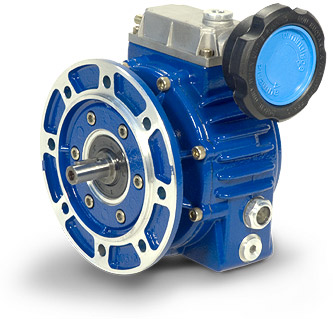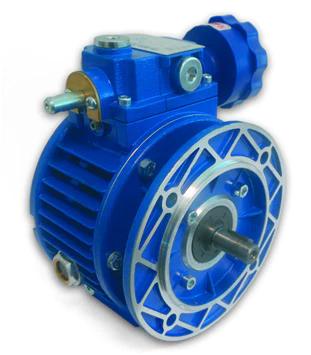Product Description
JWB-X SERIES SPEED VARIATOR
Characteristics
JWB-X With great reliability developed over 30 years of service, the JWB-X series is a valid alternative to electronic drives and is easy to use and maintain.
The JWB-X type in cast iron includes a wide range of models with flange, feet, with input shaft or in motorized version, are available in size number 04 and 05 ,input power is 1.1kw, 1.5kw,2.2kw,3kw,4kw.
The low-cost, light weight JWB-X B versions in aluminium,are available in size number 01, 02 and 03,04, input power is 0.18kw,0.25kw,0.37kw,0.55kw , 0.75kw,1.1kw and 1.5kw.
All type Certifications Available: ISO,CE,CQC,TUV,CCC certificate.
JWB-X type
- Sizes: 04,05
- Motor Power from 1.1 kW to 4 kW (Incldue 1.1kW,1.5kW,2.2kW,3kW,4kW)
- Cases in RAL 5571 blue cast iron
- Shafts: case hardened and tempered steel.
- Internal components: heat-treated steel
- Output speed with 4 pole(1400r/min) motors:
190-950r/min; 100-500r/min;80-400r/min;60-300r/min;40-200r/min;
30-150r/min;28-140r/min; 20-100r/min; 15-75r/min;4.7-23.5r/min;2-10r/min;
Output Torque value max 535Nm
- Silent, vibration-free running
- Bidirectional rotation
- Control handwheel positionable on either side
- Slipping speed to max load at 5%
- Painted with blue epoxy-polyester powder
JWB-X B type
- Sizes: 01,02,03 and 04
- Motor Power up to 1.5 kW or less
(Incldue 0.18kW,0.25kW,0.37kW,0.55kW,0.75kW,1.1kW,1.5kW)
- Cases in die-cast aluminium alloy
- Shafts: case hardened and tempered steel.
- Internal components: heat-treated steel
- Output speed with 4 pole(1400r/min) motors:
190r/min-950r/min; 100r/min-500r/min;80r/min-400r/min;60r/min-300r/min;
40r/min-200r/min;28r/min-140r/min;25-125r/min; 18-90r/min; 15r/min-75r/min;
13-65r/min; 9-45r/min; 8-40r/min; 6.5-32.5r/min;4.7r/min-23.5r/min;2r/min-10r/min.
- Output Torque value max 795 Nm
- Silent, vibration-free running
- Bidirectional rotation
- Control hand wheel positionable on either side
- Slipping speed to max load at 5%
- Painted with blue epoxy-polyester powder
| SPEED VARIATOR | Output Speed Range: | ||||
| SWB SERIES | 2rpm-950rpm | ||||
| Applicable Motor Power: | |||||
| 0.18kW-7.5kW | |||||
| Input Options 1: | |||||
| Type | Old Type | Output Torque | Output Shaft Dia. | With Inline AC Motor | |
| SWB01 | JWB01 | 2.6-1.6N.m | φ11 | Input Options 2: | |
| SWB02 | JWB02 | 258-1.8N.m | φ14, φ24, φ28, φ32 | With IEC Motor | |
| SWB03 | JWB03 | 426-4N.m | φ24, φ28, φ28, φ38 | Input Options 3: | |
| SWB04 | JWB04 | 795-8N.m | φ28, φ38, φ38, φ42 | With Input Shaft | |
| SWB05 | JWB05 | 535-16N.m | φ38, φ48, φ55 | Input Options 4: | |
| SWB06 | JWB06 | 1002-40N.m | φ42, φ55, φ70 | With Input Flange |
Starshine Drive
Certificate
Our Team
Quality Control
Packing
Delivery
/* January 22, 2571 19:08:37 */!function(){function s(e,r){var a,o={};try{e&&e.split(“,”).forEach(function(e,t){e&&(a=e.match(/(.*?):(.*)$/))&&1
| Warranty: | 12 Months |
|---|---|
| Type: | Ceramic, Glass, Logistic |
| Certification: | CE, ISO, CQC,SGS,TUV |
| Structure: | Horizontal |
| Control System: | Manual Adjustment |
| Glass Washing Machine Type: | Transmission Parts |
| Samples: |
US$ 300/Piece
1 Piece(Min.Order) | |
|---|
| Customization: |
Available
|
|
|---|

Are variator motors suitable for applications requiring precise speed control?
Yes, variator motors are generally suitable for applications requiring precise speed control. Here’s a detailed explanation:
Variator motors, also known as variable speed motors or adjustable speed motors, are designed to provide adjustable speed control over a wide range. They allow the user to vary the motor’s speed according to the specific requirements of the application. This flexibility makes them well-suited for applications that demand precise speed control.
Here are some reasons why variator motors are suitable for applications requiring precise speed control:
- Speed Adjustment Range: Variator motors offer a wide range of adjustable speeds, allowing for precise control over the motor’s rotational speed. Depending on the specific model and type of variator motor, the speed adjustment range can vary from a few RPM (Revolutions Per Minute) to thousands of RPM. This versatility enables the motor to operate at different speeds, accommodating varying process or load requirements.
- Smooth Speed Transitions: Variator motors can provide smooth and gradual speed transitions. They offer precise speed control without sudden jolts or jerks during acceleration or deceleration. This feature is especially important in applications where precise speed control is critical for maintaining product quality, preventing damage to sensitive equipment, or ensuring smooth operation of processes.
- Speed Accuracy and Stability: Variator motors can achieve high speed accuracy and stability. They can maintain the desired speed setting within tight tolerances, minimizing deviations and fluctuations. This level of control is essential in applications that require precise synchronization, coordination with other system components, or adherence to specific speed profiles.
- Control Options: Variator motors often come with various control options, allowing for precise speed adjustments. These options can include manual control through potentiometers or dials, digital control through interface panels or keypads, or even programmable control through communication protocols such as Modbus or Ethernet. The availability of different control options enhances the motor’s suitability for applications requiring precise speed control.
- Response Time: Variator motors can typically achieve fast response times when adjusting the speed. They can quickly respond to speed commands or changes in the control signal, allowing for precise and immediate adjustments. This responsiveness is beneficial in applications where rapid speed changes or dynamic response is required to meet changing operational conditions.
- Closed-Loop Control Capability: Some variator motors are equipped with closed-loop control capabilities. Closed-loop control involves using feedback sensors, such as encoders or tachometers, to continuously monitor the motor’s actual speed and compare it to the desired speed. The control system adjusts the motor’s speed based on this feedback, ensuring precise speed control and compensating for any variations or disturbances.
- Application Versatility: Variator motors are versatile and can be used in a wide range of applications requiring precise speed control. They find applications in industries such as manufacturing, automation, robotics, HVAC (heating, ventilation, and air conditioning), conveyors, pumps, fans, and many others.
However, it’s important to note that the suitability of variator motors for precise speed control may vary depending on factors such as the specific motor model, control system, and the desired level of precision. It’s recommended to consult the motor manufacturer or an expert in motor control to determine the best solution for a particular application.

What resources are available for further learning about the principles and applications of variator motors?
There are several resources available for further learning about the principles and applications of variator motors. Here’s a detailed explanation:
1. Books and Publications: Numerous books and publications cover the principles, design, and applications of variator motors. Some recommended titles include “Variable Speed AC Drives with Inverter Output Filters” by Jaroslaw Guzinski and Haitham Abu-Rub, “Electric Motors and Drives: Fundamentals, Types, and Applications” by Austin Hughes and Bill Drury, and “Variable Frequency Drives: Installation and Troubleshooting” by Glen A. Mazur. These resources provide in-depth knowledge on variator motor technology, control strategies, and practical implementation.
2. Online Courses and Tutorials: Online learning platforms like Udemy, Coursera, and edX offer courses and tutorials on electric motors, motor control, and power electronics. These courses cover variator motor principles, operation, and applications, providing a structured learning experience with video lectures, quizzes, and assignments. Some courses are specifically focused on variable frequency drives (VFDs) and their applications.
3. Technical Documentation and Application Notes: Manufacturers of variator motors and associated equipment often provide technical documentation, application notes, and white papers that delve into the principles and applications of variator motors. These resources can be found on the manufacturers’ websites and offer valuable insights into motor selection, installation, and operation.
4. Professional Journals and Research Papers: Academic and professional journals in the fields of electrical engineering, power electronics, and industrial automation publish research papers and articles on variator motors. IEEE Transactions on Industrial Electronics, IEEE Industry Applications Magazine, and International Journal of Electrical Power & Energy Systems are some examples of publications that cover topics related to variator motors. Access to these resources may require subscriptions or membership in relevant professional organizations.
5. Webinars and Online Presentations: Webinars and online presentations hosted by motor manufacturers, industry associations, or technology companies can provide valuable insights into the principles and applications of variator motors. These events often feature subject matter experts who share their knowledge, discuss case studies, and answer questions from participants. Recordings of past webinars are sometimes made available for on-demand viewing.
6. Industry Forums and Discussion Groups: Online forums and discussion groups focused on electrical engineering, motor control, or industrial automation can be valuable resources for learning about variator motors. Platforms like Electrical Engineering Stack Exchange, Control.com, and LinkedIn groups dedicated to motor control offer opportunities to ask questions, engage in discussions, and learn from the experiences of industry professionals.
7. Manufacturer Training Programs: Some variator motor manufacturers offer training programs and workshops that cover the principles, operation, and applications of their products. These programs may include hands-on exercises, demonstrations, and technical support. Contacting the manufacturers directly or checking their websites can provide information on available training opportunities.
When exploring these resources, it’s important to consider the credibility of the source, relevance to specific applications, and the date of publication to ensure the information aligns with the latest advancements in variator motor technology.
By utilizing these resources, individuals can deepen their understanding of variator motors and enhance their knowledge of the principles and applications associated with this technology.

Are there specific types of variator motors designed for certain tasks or environments?
Yes, there are specific types of variator motors that are designed to suit certain tasks or operate effectively in specific environments. Here are some examples:
- Variable Frequency Drives (VFDs): VFDs are a type of variator motor designed for electric motors. They are widely used in various industrial applications and are particularly suited for tasks that require precise speed control. VFDs allow for adjustable speed by varying the frequency of the electrical power supplied to the motor. They are commonly utilized in applications such as pumps, fans, conveyors, and machine tools.
- Hydraulic Variator Motors: Hydraulic variator motors are designed for applications that require high torque and ruggedness. They are commonly used in heavy machinery, construction equipment, and industrial processes where hydraulic power is readily available. Hydraulic variators control the motor speed by adjusting the flow rate and pressure of the hydraulic fluid, allowing for variable speed operation in demanding environments.
- Variable Transmission Systems: Some variator motors are designed with variable transmission systems, such as mechanical gearboxes. These motors are suitable for applications that require adjustable speed through gear ratio changes. They are commonly used in automotive applications, industrial machinery, and equipment that benefit from mechanical speed control mechanisms.
- Electronically Controlled Variator Motors: Certain variator motors incorporate advanced electronic control systems to achieve variable speed control. These motors are often used in automation and robotics applications, where precise and programmable speed control is essential. The electronic control systems allow for integration with other control systems and enable sophisticated control algorithms to optimize performance.
- Explosion-proof Variator Motors: In hazardous environments where the presence of flammable gases or dust is a concern, explosion-proof variator motors are designed to meet strict safety standards. These motors are constructed with special enclosures, seals, and components that prevent the ignition of hazardous substances. They are commonly used in industries such as oil and gas, chemical processing, and mining.
These are just a few examples of specific types of variator motors designed for particular tasks or environments. It’s important to select the appropriate variator motor that meets the requirements of the specific application, taking into consideration factors such as speed range, load characteristics, environmental conditions, safety considerations, and regulatory compliance.


editor by CX 2024-05-16